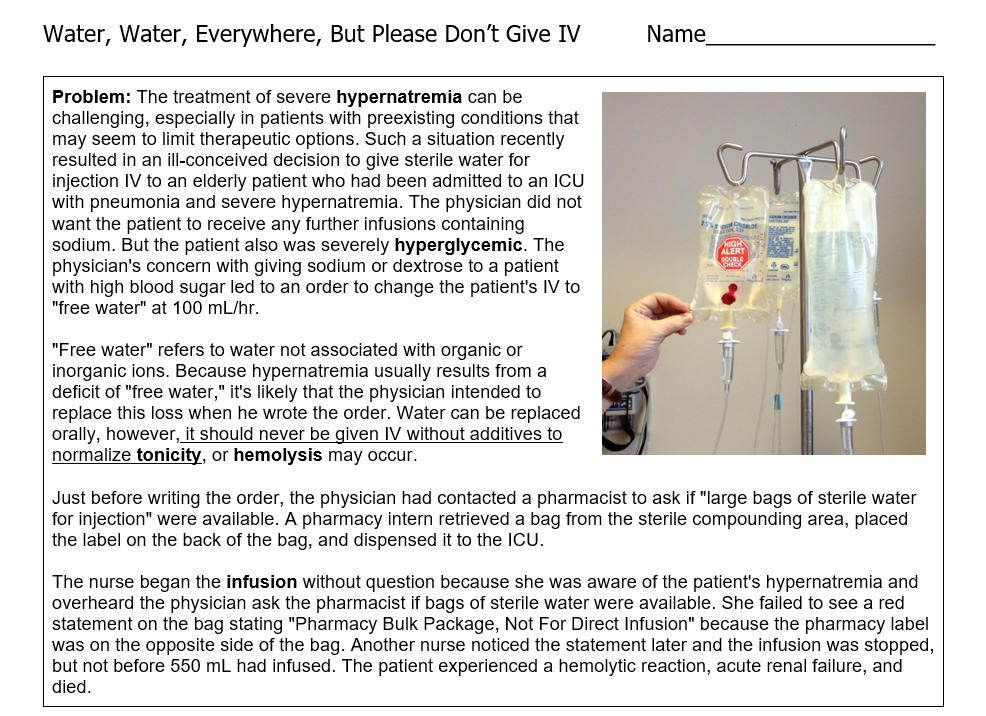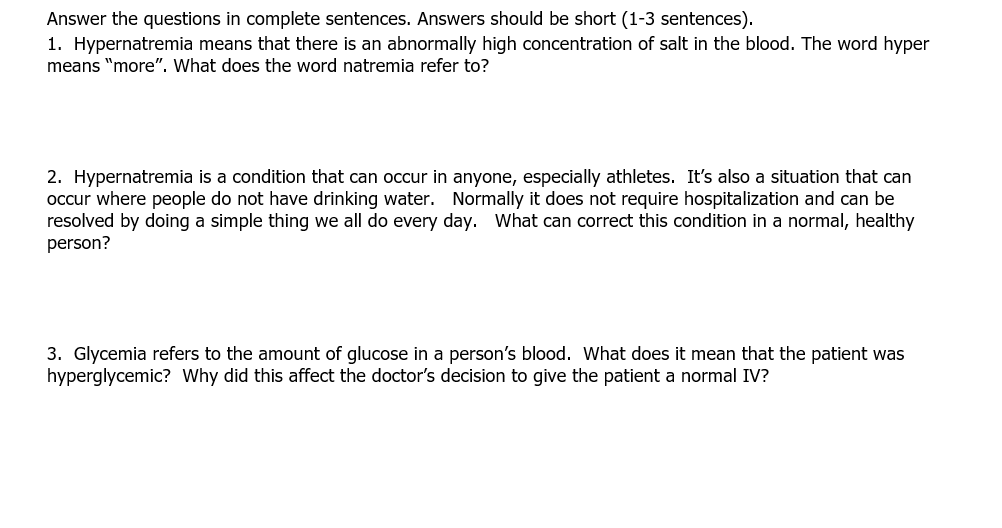Answer the questions in complete sentences. Answers should be short (1-3 sentences). 1. Hypernatremia means that there is an abnormally high concentration of salt in the blood. The word hyper means "more". What does the word natremia refer to? 2. Hypernatremia is a condition that can occur in anyone, especially athletes. It's also a situation that can occur where people do not have drinking water. Normally it does not require hospitalization and can be resolved by doing a simple thing we all do every day. What can correct this condition in a normal, healthy person? 3. Glycemia refers to the amount of glucose in a person's blood. What does it mean that the patient was hyperglycemic? Why did this affect the doctor's decision to give the patient a normal IV?
Answer the questions in complete sentences. Answers should be short (1-3 sentences). 1. Hypernatremia means that there is an abnormally high concentration of salt in the blood. The word hyper means "more". What does the word natremia refer to? 2. Hypernatremia is a condition that can occur in anyone, especially athletes. It's also a situation that can occur where people do not have drinking water. Normally it does not require hospitalization and can be resolved by doing a simple thing we all do every day. What can correct this condition in a normal, healthy person? 3. Glycemia refers to the amount of glucose in a person's blood. What does it mean that the patient was hyperglycemic? Why did this affect the doctor's decision to give the patient a normal IV?
Understanding Health Insurance: A Guide to Billing and Reimbursement
14th Edition
ISBN:9781337679480
Author:GREEN
Publisher:GREEN
Chapter6: Icd-10-cm Coding
Section: Chapter Questions
Problem 203R
Related questions
Question
100%

Transcribed Image Text:Water, Water, Everywhere, But Please Don't Give IV
Problem: The treatment of severe hypernatremia can be
challenging, especially in patients with preexisting conditions that
may seem to limit therapeutic options. Such a situation recently
resulted in an ill-conceived decision to give sterile water for
injection IV to an elderly patient who had been admitted to an ICU
with pneumonia and severe hypernatremia. The physician did not
want the patient to receive any further infusions containing
sodium. But the patient also was severely hyperglycemic. The
physician's concern with giving sodium or dextrose to a patient
with high blood sugar led to an order to change the patient's IV to
"free water" at 100 mL/hr.
"Free water" refers to water not associated with organic or
inorganic ions. Because hypernatremia usually results from a
deficit of "free water," it's likely that the physician intended to
replace this loss when he wrote the order. Water can be replaced
orally, however, it should never be given IV without additives to
normalize tonicity, or hemolysis may occur.
Name
ALERT
DE
Just before writing the order, the physician had contacted a pharmacist to ask if "large bags of sterile water
for injection" were available. A pharmacy intern retrieved a bag from the sterile compounding area, placed
the label on the back of the bag, and dispensed it to the ICU.
The nurse began the infusion without question because she was aware of the patient's hypernatremia and
overheard the physician ask the pharmacist if bags of sterile water were available. She failed to see a red
statement on the bag stating "Pharmacy Bulk Package, Not For Direct Infusion" because the pharmacy label
was on the opposite side of the bag. Another nurse noticed the statement later and the infusion was stopped,
but not before 550 mL had infused. The patient experienced a hemolytic reaction, acute renal failure, and
died.

Transcribed Image Text:Answer the questions in complete sentences. Answers should be short (1-3 sentences).
1. Hypernatremia means that there is an abnormally high concentration of salt in the blood. The word hyper
means "more". What does the word natremia refer to?
2. Hypernatremia is a condition that can occur in anyone, especially athletes. It's also a situation that can
occur where people do not have drinking water. Normally it does not require hospitalization and can be
resolved by doing a simple thing we all do every day. What can correct this condition in a normal, healthy
person?
3. Glycemia refers to the amount of glucose in a person's blood. What does it mean that the patient was
hyperglycemic? Why did this affect the doctor's decision to give the patient a normal IV?
Expert Solution
This question has been solved!
Explore an expertly crafted, step-by-step solution for a thorough understanding of key concepts.
This is a popular solution!
Trending now
This is a popular solution!
Step by step
Solved in 5 steps

Knowledge Booster
Learn more about
Need a deep-dive on the concept behind this application? Look no further. Learn more about this topic, biology and related others by exploring similar questions and additional content below.Recommended textbooks for you

Understanding Health Insurance: A Guide to Billin…
Health & Nutrition
ISBN:
9781337679480
Author:
GREEN
Publisher:
Cengage



Understanding Health Insurance: A Guide to Billin…
Health & Nutrition
ISBN:
9781337679480
Author:
GREEN
Publisher:
Cengage



Essentials of Pharmacology for Health Professions
Nursing
ISBN:
9781305441620
Author:
WOODROW
Publisher:
Cengage